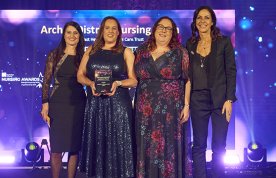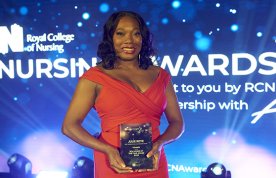
ISupport, a collaboration between 50 multidisciplinary professionals and experts from 16 countries. It has been working with children, parents and professionals to develop evidence-based international standards to define good procedural practice for children, and ensure children's short and long-term physical, emotional and psychological well-being are central in all decisions about procedures. The collaboration was inspired by Katie Dixon, who experienced multiple traumatic procedures in childhood and now has post-traumatic stress disorder. Ms Dixon challenged the ISupport lead, children’s nurse Lucy Bray, to 'make things better'. The team built a website, where the standards can be downloaded for free.

ISupport, a collaboration between 50 multidisciplinary professionals and experts from 16 countries. It has been working with children, parents and professionals to develop evidence-based international standards to define good procedural practice for children, and ensure children's short and long-term physical, emotional and psychological well-being are central in all decisions about procedures. The collaboration was inspired by Katie Dixon, who experienced multiple traumatic procedures in childhood and now has post-traumatic stress disorder. Ms Dixon challenged the ISupport lead, children’s nurse Lucy Bray, to 'make things better'. The team built a website, where the standards can be downloaded for free.

Retired Royal Navy nurse Captain Carol Betteridge has built a team of nurses and other professionals to support veterans nationwide in navigating primary healthcare services, and complement NHS support. Ms Betteridge launched Veterans Clinical Services (VCS), which has supported 2,013 veterans, mainly in the community. These include 29 very seriously injured veterans who are receiving lifelong support from a dedicated complex clinical case manager and occupational therapist, helping them thrive rather than just survive. VCS has educated thousands of practitioners on veterans’ needs, and co-delivered educational and self-help courses to veterans and their families, on issues such as managing pain, sleep, and hearing.

Retired Royal Navy nurse Captain Carol Betteridge has built a team of nurses and other professionals to support veterans nationwide in navigating primary healthcare services, and complement NHS support. Ms Betteridge launched Veterans Clinical Services (VCS), which has supported 2,013 veterans, mainly in the community. These include 29 very seriously injured veterans who are receiving lifelong support from a dedicated complex clinical case manager and occupational therapist, helping them thrive rather than just survive. VCS has educated thousands of practitioners on veterans’ needs, and co-delivered educational and self-help courses to veterans and their families, on issues such as managing pain, sleep, and hearing.

This team has increased the number of patients accessing insulin pumps and continuous glucose monitoring (CGM) devices, addressing the health inequalities experienced by those without digital skills or the hardware needed. It has built strong relationships with the medicines management team, increasing awareness of the importance of technology in diabetes management. The team sensitively identified service users who were digitally excluded due to financial constraints. It sourced and provided laptops to work in tandem with CGM monitoring, to download data from the sensors and insulin pumps provided. Improved diabetic control is shown by HbA1c blood test results

This team has increased the number of patients accessing insulin pumps and continuous glucose monitoring (CGM) devices, addressing the health inequalities experienced by those without digital skills or the hardware needed. It has built strong relationships with the medicines management team, increasing awareness of the importance of technology in diabetes management. The team sensitively identified service users who were digitally excluded due to financial constraints. It sourced and provided laptops to work in tandem with CGM monitoring, to download data from the sensors and insulin pumps provided. Improved diabetic control is shown by HbA1c blood test results

Holly Slyne led an impressive project to reduce unnecessary PPE use and reset practices adopted during the pandemic. From observations and surveys, she identified eight trends in overuse of gloves and aprons, and made a training package to address the issue, including TikTok videos, posters and screensavers. Ms Slyne refreshed the trust’s PPE policy, sending it to all staff, and porters, domestic and catering staff were trained. The initiative, which drew overwhelmingly positive feedback, is forecast to save 25,974kg carbon dioxide equivalent (CO2e), and £22,687 over the year. Before its delivery, 12% of nurses responded correctly to surveys on correct PPE use, which increased to 98% after it.

Holly Slyne led an impressive project to reduce unnecessary PPE use and reset practices adopted during the pandemic. From observations and surveys, she identified eight trends in overuse of gloves and aprons, and made a training package to address the issue, including TikTok videos, posters and screensavers. Ms Slyne refreshed the trust’s PPE policy, sending it to all staff, and porters, domestic and catering staff were trained. The initiative, which drew overwhelmingly positive feedback, is forecast to save 25,974kg carbon dioxide equivalent (CO2e), and £22,687 over the year. Before its delivery, 12% of nurses responded correctly to surveys on correct PPE use, which increased to 98% after it.

This team has developed an app – Little Hearts at Home – to ensure very young children with severe heart defects can be carefully monitored at home while they wait for further surgery. Infants get to thrive in their own environment, outside of the hospital and with close and wider family. Families report feeling reassured and facing fewer difficulties, due to not being in hospital or having to travel. Remote and in-person workshops were delivered to 200 community nurses across 29 regions of the north west network, to give them an overview of the app and get their feedback about what features they needed.


This team has developed an app – Little Hearts at Home – to ensure very young children with severe heart defects can be carefully monitored at home while they wait for further surgery. Infants get to thrive in their own environment, outside of the hospital and with close and wider family. Families report feeling reassured and facing fewer difficulties, due to not being in hospital or having to travel. Remote and in-person workshops were delivered to 200 community nurses across 29 regions of the north west network, to give them an overview of the app and get their feedback about what features they needed.


RCN Nurse of the Year 2023
Head of nursing primary care Julie Roye has brought together a multidisciplinary team, administrative staff and population health leads to co-develop improvements to cervical screening uptake in a diverse patient population. Ms Roye recruited more nurses, established evening sessions in response to feedback, enabled women to book their preferred appointment time and nurse via a texted link, and ensured texts and letters were delivered in appropriate languages for non-fluent English speakers. She ensured inclusivity for trans men and non-binary people. In nine months, screening uptake has risen from 54% to 73% for people aged 25-49, and from 62% to 82% for those aged 50-64.

RCN Nurse of the Year 2023
Head of nursing primary care Julie Roye has brought together a multidisciplinary team, administrative staff and population health leads to co-develop improvements to cervical screening uptake in a diverse patient population. Ms Roye recruited more nurses, established evening sessions in response to feedback, enabled women to book their preferred appointment time and nurse via a texted link, and ensured texts and letters were delivered in appropriate languages for non-fluent English speakers. She ensured inclusivity for trans men and non-binary people. In nine months, screening uptake has risen from 54% to 73% for people aged 25-49, and from 62% to 82% for those aged 50-64.

Julie-Anne Colvin could see there were no sleep services for adults with a learning disability, despite difficulties with sleeping having a huge impact on those people, their families and carers. The learning disability nurse developed a sleep service by first winning funding at her trust’s ‘Dragon’s Den’, employing a full-time sleep co-ordinator and securing sleep counsellor training for staff across the trust. People receive bespoke programmes and intensive support. The results have been life changing for individuals, and those close to them. For example, one man in his twenties can now sleep in his own room, and wants to live independently.

Julie-Anne Colvin could see there were no sleep services for adults with a learning disability, despite difficulties with sleeping having a huge impact on those people, their families and carers. The learning disability nurse developed a sleep service by first winning funding at her trust’s ‘Dragon’s Den’, employing a full-time sleep co-ordinator and securing sleep counsellor training for staff across the trust. People receive bespoke programmes and intensive support. The results have been life changing for individuals, and those close to them. For example, one man in his twenties can now sleep in his own room, and wants to live independently.

Led by senior staff nurse Michaela Heaton, and in partnership with service users, this team has created the Bus Stop, a place for short therapeutic interventions on the inpatient unit. Originally a corridor where people stopped to talk to nurses sitting and writing up notes, the space has been transformed through collaboration with Lancashire County Council, Lush and Unilever, as a safe and sociable area. Ms Heaton secured official bus stop signs and timetables using the ward name. Staff have been trained to develop and deliver activities, and there has been a 60% reduction of self-harm, and 25% reduction in violence and aggression, on the ward.

Led by senior staff nurse Michaela Heaton, and in partnership with service users, this team has created the Bus Stop, a place for short therapeutic interventions on the inpatient unit. Originally a corridor where people stopped to talk to nurses sitting and writing up notes, the space has been transformed through collaboration with Lancashire County Council, Lush and Unilever, as a safe and sociable area. Ms Heaton secured official bus stop signs and timetables using the ward name. Staff have been trained to develop and deliver activities, and there has been a 60% reduction of self-harm, and 25% reduction in violence and aggression, on the ward.

Dementia nurse consultant Kumar Ponnusamy wanted to address the memory clinic waiting list and create a memory assessment service to focus on diagnosis and improving dementia care in care homes. He wrote a business case, engaged stakeholders and designed a clinical pathway for the service. Mr Ponnusamy created nurse-led multidisciplinary meetings for case discussion, diagnosis and devising care plans, including reviews of antipsychotic medication. He also offered clinical supervision to mental health practitioners involved in the assessment process. In the first six months,109 people were assessed, with 95 receiving a diagnosis of dementia. Thirteen people were referred on to other services. Three discontinued antipsychotic medication.

Dementia nurse consultant Kumar Ponnusamy wanted to address the memory clinic waiting list and create a memory assessment service to focus on diagnosis and improving dementia care in care homes. He wrote a business case, engaged stakeholders and designed a clinical pathway for the service. Mr Ponnusamy created nurse-led multidisciplinary meetings for case discussion, diagnosis and devising care plans, including reviews of antipsychotic medication. He also offered clinical supervision to mental health practitioners involved in the assessment process. In the first six months,109 people were assessed, with 95 receiving a diagnosis of dementia. Thirteen people were referred on to other services. Three discontinued antipsychotic medication.

During her placement, Leanne Howlett identified how daunting it can be for young people being discharged from mental health services. She could see they felt a real loss and increased anxiety, having been held by the service. Ms Howlett developed a resource to reassure and support young people to reflect on their recovery and all that they had learnt. The Discharge Wellbeing pack has been ratified by the nurses forum, and the service delivery and quality meeting, and will be rolled out across the whole service. The patients who have received the pack have reported that it has improved their discharge experience, helping to reframe it as something positive.

During her placement, Leanne Howlett identified how daunting it can be for young people being discharged from mental health services. She could see they felt a real loss and increased anxiety, having been held by the service. Ms Howlett developed a resource to reassure and support young people to reflect on their recovery and all that they had learnt. The Discharge Wellbeing pack has been ratified by the nurses forum, and the service delivery and quality meeting, and will be rolled out across the whole service. The patients who have received the pack have reported that it has improved their discharge experience, helping to reframe it as something positive.

Head of nursing Lloyd Griffiths nominated these two support workers for ensuring all staff at child and adolescent mental health services inpatient unit Ty Llidiard receive prevention and management of violence and aggression training. Christian Harris and Kirsten Jenkins tailor training for children and young people. Their proactive approach includes the development of a bespoke chair with weighted comfort blanket for young people with eating disorders who have to be restrained while being fed, which has reduced the restraint required and trauma. They are passionate, dedicated, excellent role models, who play an active part in post-incident staff support and debrief.

Head of nursing Lloyd Griffiths nominated these two support workers for ensuring all staff at child and adolescent mental health services inpatient unit Ty Llidiard receive prevention and management of violence and aggression training. Christian Harris and Kirsten Jenkins tailor training for children and young people. Their proactive approach includes the development of a bespoke chair with weighted comfort blanket for young people with eating disorders who have to be restrained while being fed, which has reduced the restraint required and trauma. They are passionate, dedicated, excellent role models, who play an active part in post-incident staff support and debrief.

Janette Connor has nominated her district nursing team led by sister Orla Glennon. She says: ‘Because of my rare disease, I have over 200 skin ulcers that the team has dressed daily for two years, as well as looking after other elements of my care, such as my Hickman line. They have been an advocate for me, always trying to find ways to make a difference. I’m not a complex case when I am with them, but a person who has good days and bad, hopes and goals. All the nurses take a holistic approach. They know what is happening in my life and what’s important to me. Before I was under their care, in one year I spent close to 200 nights in hospital. With this team I’ve had one unplanned admission in two years.’

Janette Connor has nominated her district nursing team led by sister Orla Glennon. She says: ‘Because of my rare disease, I have over 200 skin ulcers that the team has dressed daily for two years, as well as looking after other elements of my care, such as my Hickman line. They have been an advocate for me, always trying to find ways to make a difference. I’m not a complex case when I am with them, but a person who has good days and bad, hopes and goals. All the nurses take a holistic approach. They know what is happening in my life and what’s important to me. Before I was under their care, in one year I spent close to 200 nights in hospital. With this team I’ve had one unplanned admission in two years.’

Roxanne Crosby-Nwaobi leads a campaign to raise awareness of taking part in research opportunities among minority ethnic groups and people from deprived areas, traditionally poorly represented in clinical trials. A lead nurse for research, Dr Crosby-Nwaobi’s digital platform enables patients to easily sign up for trials. Her work with focus groups to co-produce and translate promotional materials has been translated into Gujarati, Punjabi, Hindi, Urdu and Bengali, with Turkish, Polish, Pashto and Dari in progress. Dr Crosby-Nwaobi is on track to deliver 50 roadshows by March 2024, some addressing up to 500 people. Through radio interviews, she has reached almost 43 million listeners.

Roxanne Crosby-Nwaobi leads a campaign to raise awareness of taking part in research opportunities among minority ethnic groups and people from deprived areas, traditionally poorly represented in clinical trials. A lead nurse for research, Dr Crosby-Nwaobi’s digital platform enables patients to easily sign up for trials. Her work with focus groups to co-produce and translate promotional materials has been translated into Gujarati, Punjabi, Hindi, Urdu and Bengali, with Turkish, Polish, Pashto and Dari in progress. Dr Crosby-Nwaobi is on track to deliver 50 roadshows by March 2024, some addressing up to 500 people. Through radio interviews, she has reached almost 43 million listeners.

This team, led by addiction nurse practitioner Eugenia Moyo-Hlahla, impressed the judges with its commitment to reducing health inequalities and stigma, by improving marginalised populations’ access to hepatitis C testing and treatment. It worked tirelessly to achieve micro-elimination of the virus in Hounslow as part of NHS England’s target by 2025 – and achieved its aims and targets two years early. Its innovative approach includes incentives to attend testing events, and tests on prescription collection days to reduce non-attendance. Proactive outreach included joint working with rangers, increasing access to groundbreaking treatments, and reducing drug injecting in local parks.


This team, led by addiction nurse practitioner Eugenia Moyo-Hlahla, impressed the judges with its commitment to reducing health inequalities and stigma, by improving marginalised populations’ access to hepatitis C testing and treatment. It worked tirelessly to achieve micro-elimination of the virus in Hounslow as part of NHS England’s target by 2025 – and achieved its aims and targets two years early. Its innovative approach includes incentives to attend testing events, and tests on prescription collection days to reduce non-attendance. Proactive outreach included joint working with rangers, increasing access to groundbreaking treatments, and reducing drug injecting in local parks.


Staff survey results and feedback sessions showed nurses did not feel valued, supported or empowered to improve their service or give care to the standard they aspired to. Nurse vacancies were high. However, the nursing workforce and education team has hugely reduced them. Its innovative Grow our Own programme supports the trust’s existing and future workforce to ensure it is able to give great care. The team focuses on demonstrating that it values staff by supporting their development and career progression, looking after their health and well-being, and providing pastoral care. Nursing support workers and internationally educated nurses have been supported to become registered nurses.


Staff survey results and feedback sessions showed nurses did not feel valued, supported or empowered to improve their service or give care to the standard they aspired to. Nurse vacancies were high. However, the nursing workforce and education team has hugely reduced them. Its innovative Grow our Own programme supports the trust’s existing and future workforce to ensure it is able to give great care. The team focuses on demonstrating that it values staff by supporting their development and career progression, looking after their health and well-being, and providing pastoral care. Nursing support workers and internationally educated nurses have been supported to become registered nurses.




